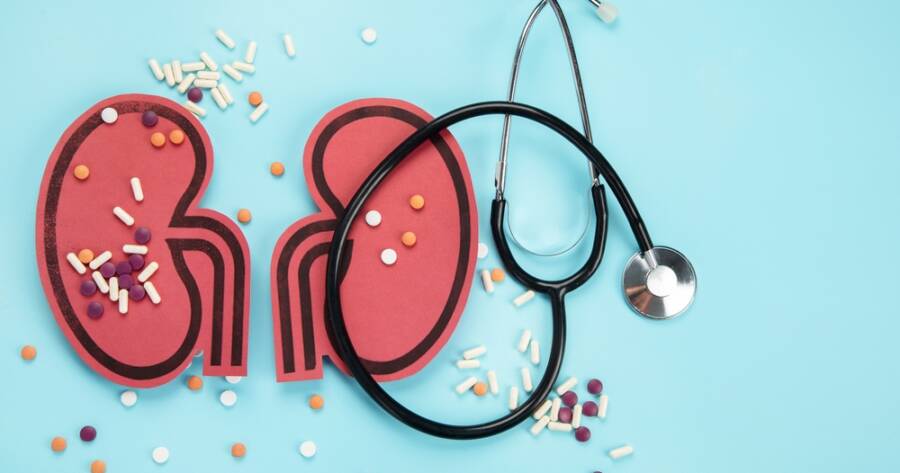Kidney disease often develops silently, with few or no noticeable symptoms until it reaches advanced stages, leading to serious health complications if undiagnosed and untreated. Early detection plays a critical role, as it enables timely medical interventions that can significantly slow or even prevent the progression to more severe stages. Regular screenings and awareness of risk factors, such as diabetes and high blood pressure, are essential for protecting kidney health and maintaining overall well-being.
The Basics
The waste products that the kidneys filter from the blood are then excreted through the urine. The two main waste products are urea and sodium. Urea is a waste product of protein metabolism and constitutes about half of the waste products present in the urine. Sodium is an essential mineral that you get from your diet, and excess amounts are excreted. Other waste products include ammonia, uric acid, oxalate, and various minerals.
What Causes Chronic Kidney Disease?
There are about one million filters, or nephrons, in each of your kidneys. Damaged nephrons stop doing their job. When enough nephrons have been damaged, your kidneys can’t filter your blood well enough for you to stay healthy.
When your kidneys haven’t been functioning properly for more than three months, you have chronic kidney disease. This is a serious condition, due to the lack of symptoms in earlier stages as well as the serious complications. Chronic kidney disease is a medical problem that needs to be addressed as quickly as possible, especially considering that kidney damage often can’t be repaired.
The most common causes are diabetes (both types) and high blood pressure. Immune system conditions are another common culprit, such as lupus and AIDS. Other possible causes include hepatitis B, hepatitis C, recurrent urinary tract infections, and kidney damage caused by drug abuse.
Possible Complications
Chronic kidney disease can cause serious complications, including but not limited to:
- Fluid retention, which can lead to other complications such as swelling, high blood pressure, and pulmonary edema.
- Cardiovascular disease.
- This can also lead to heart problems and pregnancy complications.
- Damage to the central nervous system, which can have unpredictable side effects such as intellectual difficulties, seizures, and personality changes.
- Pericarditis, which occurs when the membrane surrounding your heart becomes inflamed.
- Pregnancy complications, placing both the mother and fetus at risk.
- Hyperkalemia, or a sudden rise in blood potassium levels, which can be life-threatening.
- Decreased libido.
- Compromised immune system.
- Irreversible kidney damaging, requiring dialysis or a kidney transplant.
10 Signs You Should See a Doctor
Now, let’s take a look at 10 signs that you might have kidney health issues:
- Loss of appetite: However, a huge variety of illnesses can result in loss of appetite, from mild to serious diseases, including mental health issues such as depression. Rule out all other possible causes if you experience loss of appetite.
- Decreased urine volume: This can also be caused by simple dehydration. If you’re drinking plenty of water but still aren’t urinating much, this is likely a sign of a kidney condition or other problem.
- Pale skin. Being more pale than normal, if you also experience other symptoms, can point to chronic kidney disease.
- High blood pressure: If you’re at a healthy weight, have a balanced diet, get plenty of exercise, and aren’t particularly stressed, yet you still have high blood pressure, it may be a sign.
- Muscle cramps: Especially leg cramps. Although everyone experiences muscle cramps at some time in their life, if you experience them frequently with no obvious cause, talk to your doctor.
- Swelling of the eyelids and ankles in particular are symptoms of a kidney condition: Rule out lack of sleep causing eyelid puffiness.
- Chronic fatigue: Chronic fatigue is one of the more severe and worrying symptoms of chronic kidney disease. Many serious conditions have chronic fatigue as a symptom, so it should not be ignored.
- Nausea and vomiting: Though many less severe conditions, such as acute food poisoning, may cause nausea and vomiting, if it occurs on a regular basis with no obvious cause, you should talk to your doctor.
- Dry, itchy skin: Skin often gets dry and itchy in the wintertime, after bathing in water that is too hot, after contact with an allergenic plant, or if you have an underlying skin condition. However, unexplainable dry and itchy skin could be a sign of chronic kidney disease.
- Unpleasant taste in the mouth: Often accompanied by a urine-like odor on the breath. This uncommon symptom is a likely sign of a kidney condition or other urinary tract problem.
If you experience any of these symptoms of kidney disease, especially a combination of two or more, you should talk to your doctor.
Learn More Today
Maintaining kidney health is crucial for overall well-being, as kidney disease often progresses silently, leading to severe complications if undiagnosed. Recognizing early signs such as fatigue, swelling, and changes in urine output can prompt timely medical intervention, potentially slowing the disease’s progression.
By understanding the causes, symptoms, and risks associated with kidney issues, individuals can take proactive steps, including regular check-ups and lifestyle adjustments, to safeguard their kidney function and prevent long-term damage. Early detection remains the key to managing kidney disease effectively and improving outcomes.
